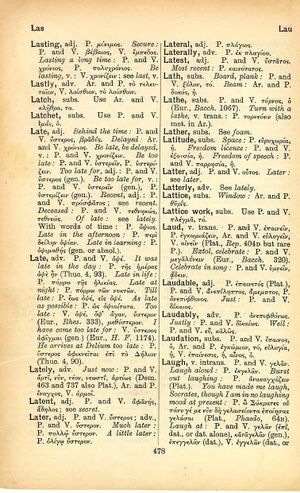late: Difference between revisions
ἀσκεῖν περὶ τὰ νοσήματα δύο, ὠφελεῖν ἢ μὴ βλάπτειν → strive, with regard to diseases, for two things — to do good, or to do no harm | as to diseases, make a habit of two things — to help, or at least, to do no harm
m (Text replacement - "(|thumb)\n(\|link=)" to "$1$2") |
m (Woodhouse1 replacement) |
||
| Line 1: | Line 1: | ||
{{Woodhouse1 | {{Woodhouse1 | ||
|Text=[[File:woodhouse_478.jpg|thumb|link={{filepath:woodhouse_478.jpg}}]] | |Text=[[File:woodhouse_478.jpg|thumb|link={{filepath:woodhouse_478.jpg}}]] | ||
===adjective=== | |||
[[behind the time]]: [[prose|P.]] and [[verse|V.]] [[ὕστερος]], [[βραδύς]]. | |||
[[delayed]]: [[Aristophanes|Ar.]] and [[verse|V.]] [[χρόνιος]]. | |||
[[be late]], [[be delayed]], v.; [[prose|P.]] and [[verse|V.]] [[χρονίζειν]]. | |||
[[be too late]]: [[prose|P.]] and [[verse|V.]] [[ὑστερεῖν]], [[prose|P.]] [[ὑστερίζειν]]. | |||
[[too late for]], adj.: [[prose|P.]] and [[verse|V.]] [[ὕστερος]] (gen.). | |||
[[be too late for]], v.: [[prose|P.]] and [[verse|V.]] [[ὑστερεῖν]] (gen.), [[prose|P.]] [[ὑστερίζειν]] (gen.). | |||
P. and V. ὀψέ. | |||
[[recent]], adj.: [[prose|P.]] and [[verse|V.]] [[πρόσφατος]]; see [[recent]]. | |||
[[deceased]]: [[prose|P.]] and [[verse|V.]] [[τεθνηκώς]], [[τεθνεώς]]. | |||
of [[late]]: see [[lately]]. | |||
[[with words of time]]: [[prose|P.]] [[ὄψιος]]. | |||
[[late in the afternoon]]: [[prose|P.]] [[περὶ δείλην ὀψίαν]]. | |||
[[late in learning]]: [[prose|P.]] [[ὀψιμαθής]] (gen. or absol.). | |||
===adverb=== | |||
[[prose|P.]] and [[verse|V.]] [[ὀψέ]]. | |||
[[it was late in the day]]: [[prose|P.]] [[τῆς ἡμέρας ὀψὲ]] ἦν ([[Thucydides|Thuc.]] 4, 93). | |||
[[late in life]]: [[prose|P.]] [[πόρρω τῆς ἡλικίας]]. | |||
[[late at night]]: [[prose|P.]] [[πόρρω τῶν νυκτῶν]]. | |||
[[till late]]: [[prose|P.]] [[ἕως ὀψέ]], [[εἰς ὀψέ]]. | |||
[[as late us possible]]: [[prose|P.]] [[ὠς ὀψιαίτατα]]. | |||
[[too late]]: [[verse|V.]] [[ὀψέ]], [[ὄψ' ἄγαν]], [[ὕστερον]] ([[Euripides|Eur.]], ''[[Rhesus]]'' 333), [[μεθύστερον]]. | |||
[[I have come too late for]]: [[verse|V.]] [[ὕστερος ἀφῖγμαι]] (gen.) ([[Euripides|Eur.]], ''[[Hercules Furens]]'' 1174). | |||
[[he arrives at Delium too late]]: [[prose|P.]] [[ὕστερος ἀφικνεῖται ἐπὶ τὸ Δήλιον]] ([[Thucydides|Thuc.]] 4, 90). | |||
}} | }} | ||
{{Lewis | {{Lewis | ||
Revision as of 08:50, 20 May 2020
English > Greek (Woodhouse)
adjective
behind the time: P. and V. ὕστερος, βραδύς.
be late, be delayed, v.; P. and V. χρονίζειν.
be too late: P. and V. ὑστερεῖν, P. ὑστερίζειν.
too late for, adj.: P. and V. ὕστερος (gen.).
be too late for, v.: P. and V. ὑστερεῖν (gen.), P. ὑστερίζειν (gen.).
recent, adj.: P. and V. πρόσφατος; see recent.
deceased: P. and V. τεθνηκώς, τεθνεώς.
late in the afternoon: P. περὶ δείλην ὀψίαν.
late in learning: P. ὀψιμαθής (gen. or absol.).
adverb
it was late in the day: P. τῆς ἡμέρας ὀψὲ ἦν (Thuc. 4, 93).
late in life: P. πόρρω τῆς ἡλικίας.
late at night: P. πόρρω τῶν νυκτῶν.
till late: P. ἕως ὀψέ, εἰς ὀψέ.
as late us possible: P. ὠς ὀψιαίτατα.
too late: V. ὀψέ, ὄψ' ἄγαν, ὕστερον (Eur., Rhesus 333), μεθύστερον.
I have come too late for: V. ὕστερος ἀφῖγμαι (gen.) (Eur., Hercules Furens 1174).
he arrives at Delium too late: P. ὕστερος ἀφικνεῖται ἐπὶ τὸ Δήλιον (Thuc. 4, 90).
Latin > English (Lewis & Short)
lātē: adv., v. 1. latus.
Latin > French (Gaffiot 2016)
(1) lātē⁸ (latus), largement, sur un large espace, avec une large étendue : quam latissime Cæs. G. 4, 3, 1, sur la plus large étendue possible, cf. Cæs. G. 4, 35, 3 ; Cic. Pomp. 31 ; equites late ire jubet Sall. J. 68, 4, il ordonne que les cavaliers marchent en ordre déployé || [fig.] avec une grande extension, largement, abondamment : se latius fundet orator Cic. Or. 125, l’orateur se donnera plus libre carrière, cf. Cic. Tusc. 3, 22 ; Ac. 2, 66 ; locus longe et late patens Cic. Or. 72, chapitre (= matière, question) étendu et vaste.
Latin > German (Georges)
lātē, Adv. (latus), I) breit, in der Breite, longe lateque, weit und breit, Cic., Caes. u.a.: dass. late longeque, Naev. tr. 52. Cic. (de legg. 1, 34), Sen. u.a.: longe atque late, Cic. Marc. 29: late ac longe, Liv. 21, 35, 8: late ire, nicht in Reih und Glied, Sall. fr. – u. für unser weit, weit und breit, vallis late patens, Hirt. b. G.: late od. latius vagari, Caes.: murus latius, quam caederetur, ruebat, fiel weiter ein, als man hineinhieb, Liv.: late dominari, Augustin.: populus late rex, Verg.: ebenso late tyrannus, Hor.: Germaniae latissime victor, Plin. ep.: quam latissime circum se vastatis finibus solitudines habere, Caes.: his praecipit, ut primā nocte, quam latissime possint, ignes faciant quam maximos, Nep.: Sullanus ager latissime continuatus, Cic. – II) übtr.: 1) im allg.: ars late patet, Cic.: fidei bonae nomen latissime manat, Cic. – 2) insbes.: a) in großer Ausdehnung = reichlich, quae res latius aerarium populi Rom., quam ullus triumphus implevit, Flor.: latius integris opibus uti, einen ausgedehnteren Gebrauch machen von usw., Hor.: sibi indulgere latius, in ausgiebiger Weise, Iuven. – b) ausgedehnt, weitläufig, ausführlich, referre primordia gentis, Ov.: fuse lateque (Ggstz. brevissime) dicere de alqa re, Cic.: latius loqui (Ggstz. compressius), Cic.: latius perscribere, Caes. – c) in weiter Bedeutung, in weitem Sinne, verba late concipere, ICt.
Latin > English
late ADV :: widely, far and wide

